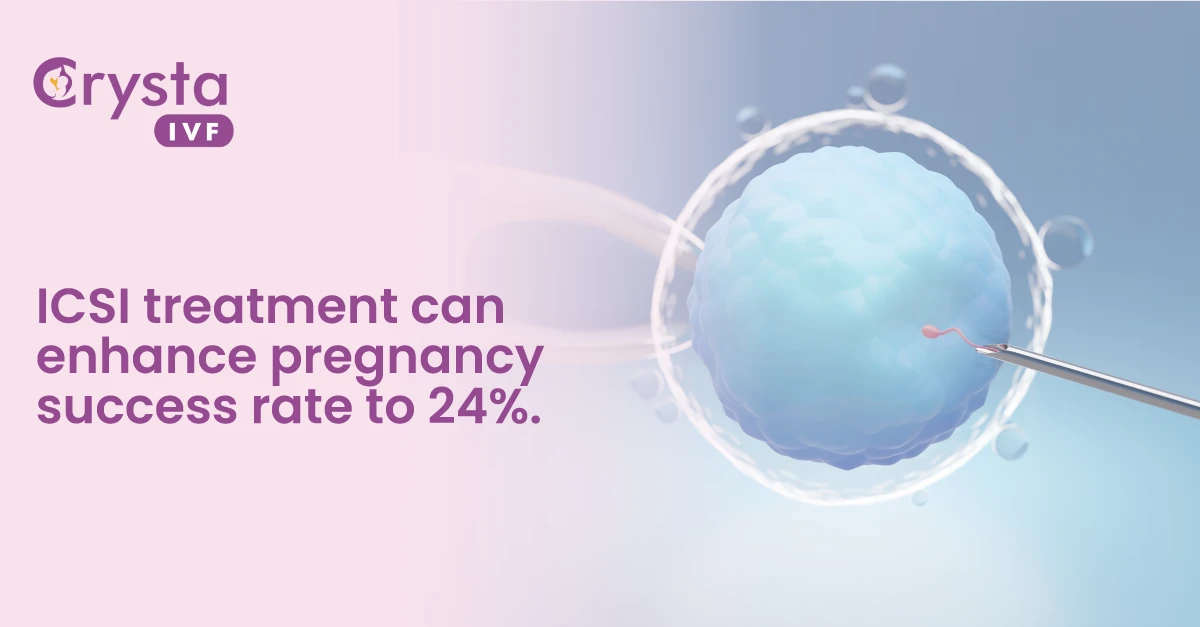Have you been diagnosed with infertility recently? Yes? Infertility is a reproductive health condition that can be emotionally and mentally traumatizing. It is always important to understand what kind of treatment is suitable for the intended couple or person.
Among all other treatments, ICSI treatment or intracytoplasmic sperm injection is a kind of IVF used mainly for the treatment of male infertility. It incorporates the single injection directly into the mature egg with single sperm.
If you aren’t certain whether you must get the intracytoplasmic sperm injection treatment done, then you must follow this write-up. You will find everything related to the treatment.
So, let’s first start with the basics.
Fast Facts
- ICSI is a short form for Intracytoplasmic sperm injection
- The treatment was first introduced by Gianpierro Palermo at Brussels University.
- With the help of ICSI, the first birth took place in the year 1992.
What is intracytoplasmic sperm injection or ICSI treatment?
ICSI treatment is a form of IVF infertility treatment that is used involving a single sperm injection directly to fertilize the egg. After the fertilization of an egg, it is moved into the female uterus so that pregnancy occurs.
The complete process of ICSI is quite similar to the IVF, the only difference is that IVF process fertilization takes place in the dish and in ICSI the physician picks the sperm from a provided sample. Further, it is directly injected into every egg. It is known as the most successful fertility treatment.
ICSI treatment process
There is a process followed in ICSI treatment that involves mature egg formation. Fertility medication is probably provided to enhance your ovaries so that they can form various eggs for fertilization purposes. If you are considering the treatment, surely because the condition is related to male infertility.
The treatment is also used by couples who did not achieve success with other available treatments.

Here is the ICSI process step-by-step you must know:
- The physician will require your sperm sample or be surgically extracted if needed.
- The extraction of eggs is initiated by surgery for the females.
- With the use of a hollow needle, the sperm is injected into the egg.
- After the process is over, the fertilized egg and growth are observed.
- Once the embryo is formed representing all the normal development, the embryo is moved into the female uterus.
When do you need the ICSI treatment?
The ICSI treatment offers you the advanced reproductive technological fertility treatment. If you both are planning pregnancy and wishing to get the ICSI treatment done, then you need to observe the below problems:
- When the sperm is absent because of the blockage.
- When your sperm count is low and the quality is poor.
- If the shape of semen is abnormal and movement.
- There is no penetration and fertilization is becoming difficult.
These are some of the usual reasons why ICSI treatment is recommended to males when planning a pregnancy with their partners. So, if you are also intending to achieve parenthood, ensure to get in touch with an infertility specialist as they can guide you better.
Does ICSI treatment work?
ICSI treatment can fertilize around 50-80% of eggs. However, there are issues during and after the ICSI process you should know:
- Some eggs may be damaged and aren’t usable for fertilization purpose further.
- Sometimes, the egg doesn’t develop into an embryo even after following the injection process with the sperm.
- The embryo may stop developing.
Is ICSI treatment a safe treatment?
Yes, ICSI treatment is completely safe as per the study by the American Society of Reproductive Medicine. It is among the most effective procedures for couples facing the issue of male infertility. With this treatment, they can also enhance the fertilization chance for couples with poor fertilization in the preceding IVF cycle.

Risks with ICSI treatment
There are no severe risks associated with intracytoplasmic sperm injection treatment or ICSI, however, it can face some issues like:
For the egg: The ICSI treatment is known to be invasive and needs more care than IVF treatment, there is a slight chance like 2% that the egg gets damaged during the process as a result of a non-viable egg.
For the child: There is no evidence that any child born from ICSI treatment has faced any major issue. Thousands of children across the globe have been born as a consequence of the treatment. Though, there are chances that a male child born with the ICSI technique may have fertility issues like his father.
Endnote
Fertility can be challenging but there are treatments like ICSI treatment that proves to be useful for couples who are facing male infertility challenges. If you are also experiencing infertility and aren’t mindful of the ICSI method, then we hope that this blog would be useful for you to gain a better understanding.
Before choosing the treatment, ensure to reach out to the fertility expert. You can also get in touch with an expert like Crysta IVF assisting countless couples to achieve pregnancy.




